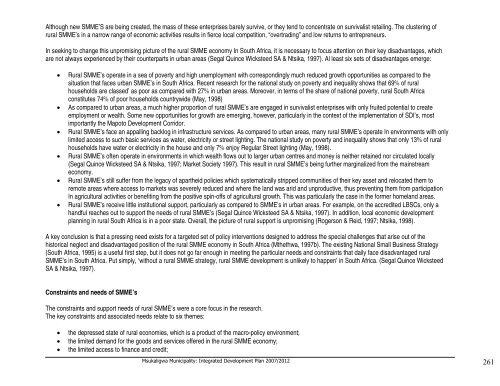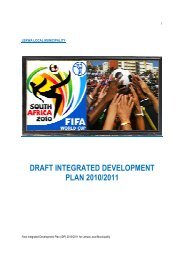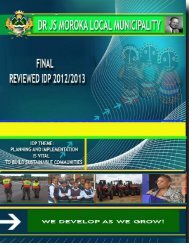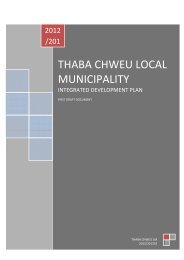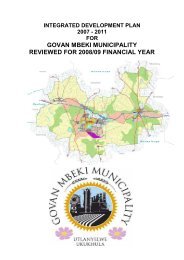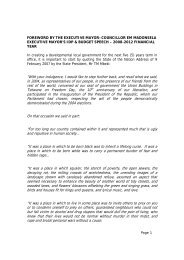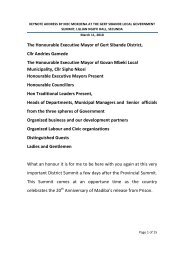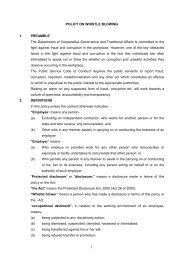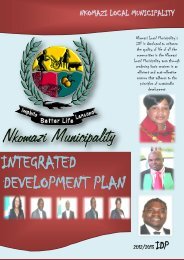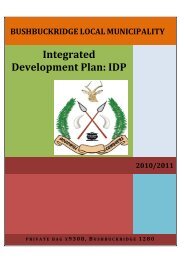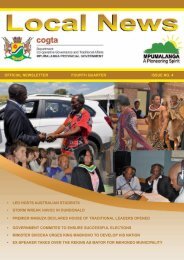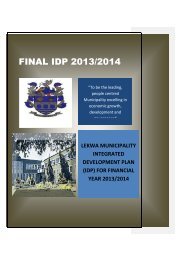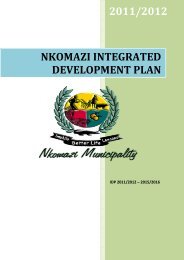Msukaligwa Local Municipality 2008/09 - Co-operative Governance ...
Msukaligwa Local Municipality 2008/09 - Co-operative Governance ...
Msukaligwa Local Municipality 2008/09 - Co-operative Governance ...
Create successful ePaper yourself
Turn your PDF publications into a flip-book with our unique Google optimized e-Paper software.
Although new SMME’S are being created, the mass of these enterprises barely survive, or they tend to concentrate on survivalist retailing. The clustering ofrural SMME’s in a narrow range of economic activities results in fierce local competition, “overtrading” and low returns to entrepreneurs.In seeking to change this unpromising picture of the rural SMME economy In South Africa, it is necessary to focus attention on their key disadvantages, whichare not always experienced by their counterparts in urban areas (Segal Quince Wicksteed SA & Ntsika, 1997). Al least six sets of disadvantages emerge:• Rural SMME’s operate in a sea of poverty and high unemployment with correspondingly much reduced growth opportunities as compared to thesituation that faces urban SMME’s in South Africa. Recent research for the national study on poverty and inequality shows that 69% of ruralhouseholds are classed’ as poor as compared with 27% in urban areas. Moreover, in terms of the share of national poverty, rural South Africaconstitutes 74% of poor households countrywide (May, 1998)• As compared to urban areas, a much higher proportion of rural SMME’s are engaged in survivalist enterprises with only fruited potential to createemployment or wealth. Some new opportunities for growth are emerging, however, particularly in the context of the implementation of SDI’s, mostimportantly the Mapoto Development <strong>Co</strong>rridor.• Rural SMME’s face an appalling backlog in infrastructure services. As compared to urban areas, many rural SMME’s operate In environments with onlylimited access to such basic services as water, electricity or street lighting. The national study on poverty and inequality shows that only 13% of ruralhouseholds have water or electricity in the house and only 7% enjoy Regular Street lighting (May, 1998).• Rural SMME’s often operate in environments in which wealth flows out to larger urban centres and money is neither retained nor circulated locally(Segal Quince Wicksteed SA & Ntsika, 1997; Market Society 1997). This result in rural SMME’s being further marginalized from the mainstreameconomy.• Rural SMME’s still suffer from the legacy of apartheid policies which systematically stripped communities of their key asset and relocated them toremote areas where access to markets was severely reduced and where the land was arid and unproductive, thus preventing them from participationIn agricultural activities or benefiting from the positive spin-offs of agricultural growth. This was particularly the case in the former homeland areas.• Rural SMME’s receive little institutional support, particularly as compared to SMME’s in urban areas. For example, on the accredited LBSCs, only ahandful reaches out to support the needs of rural SMME’s (Segal Quince Wicksteed SA & Ntsika, 1997). In addition, local economic developmentplanning in rural South Africa is in a poor state. Overall, the picture of rural support is unpromising (Rogerson & Reid, 1997; Ntsika, 1998).A key conclusion is that a pressing need exists for a targeted set of policy interventions designed to address the special challenges that arise out of thehistorical neglect and disadvantaged position of the rural SMME economy in South Africa (Mthethwa, 1997b). The existing National Small Business Strategy(South Africa, 1995) is a useful first step, but it does not go far enough in meeting the particular needs and constraints that daily face disadvantaged ruralSMME’s in South Africa. Put simply, ‘without a rural SMME strategy, rural SMME development is unlikely to happen’ in South Africa. (Segal Quince WicksteedSA & Ntsika, 1997).<strong>Co</strong>nstraints and needs of SMME’sThe constraints and support needs of rural SMME’s were a core focus in the research.The key constraints and associated needs relate to six themes:• the depressed state of rural economies, which is a product of the macro-policy environment;• the limited demand for the goods and services offered in the rural SMME economy;• the limited access to finance and credit;<strong>Msukaligwa</strong> <strong>Municipality</strong>: Integrated Development Plan 2007/2012 261


